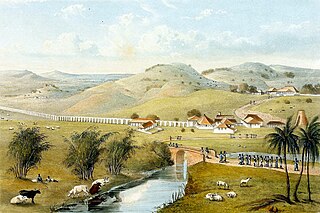
The parishes of Jamaica are the main units of local government in Jamaica. They were created following the English Invasion of Jamaica in 1655. This administrative structure for the Colony of Jamaica developed slowly. However, since 1 May 1867, Jamaica has been divided into the current fourteen parishes. These were retained after independence in 1962. They are grouped into three historic counties, which no longer have any administrative relevance. Every parish has a coast; none are landlocked.

The Crown Colony of Jamaica and Dependencies was a British colony from 1655, when it was captured by the English Protectorate from the Spanish Empire. Jamaica became a British colony from 1707 and a Crown colony in 1866. The Colony was primarily used for sugarcane production, and experienced many slave rebellions over the course of British rule. Jamaica was granted independence in 1962.

Henry Dawkins II was a Jamaican plantation and slave owner and Member of the Parliament of Great Britain (MP).

Nathaniel Bayly was an English planter and politician who sat in the House of Commons from 1770 to 1779.
Curtis Philip Berry was the owner of the Trinity estate in Manchester Parish, Jamaica, and a slave-owner. He was an architect by profession and also served as a magistrate. He was elected to the House of Assembly of Jamaica in 1820.
John Blythe was the owner of the Kendal and Tweedside estates in Westmoreland Parish, Jamaica. He was elected to the House of Assembly of Jamaica in 1820.
Hamilton Brown was an Irish-born planter and politician who resided in Saint Ann Parish, Jamaica, which he represented in the House of Assembly of Jamaica for 22 years. Brown founded the settlement of Hamilton Town in Saint Ann Parish, which was named after him.
John Hanson was a planter in Jamaica and the owner of the Salt Pond Pen. He inherited this estate from his father, the planter and slave owner John Hanson. He was elected to the House of Assembly of Jamaica in 1820.
John Mais (1778-1853) was a planter and slave-owner in Jamaica. He was elected to the House of Assembly of Jamaica in 1820 for the parish of Saint Andrew.
Henry James Passley was a planter and slave-owner in Jamaica. He owned Rodney Hall plantation in the parish of Portland with John Paton Passley and Richard Brown Passley. He was elected to the House of Assembly of Jamaica in 1820.
William Rodon Rennalls was a lawyer in Jamaica and barrister of the Middle Temple in London. He was elected to the House of Assembly of Jamaica in 1820 for the Parish of Saint Catherine.
Peter Robertson was a planter and slave-owner in Jamaica. He owned Dunrobin Plantation, Friendship Valley Pen, Prospect pen, and the Weybridge Estate, and had interests in others. He was elected to the House of Assembly of Jamaica in 1820 for the parish of Saint Thomas-in-the-East.
William Stimpson was a planter and slave-owner in Jamaica. He owned the Java Plantation in Manchester Parish and had interests in others. He was elected to the House of Assembly of Jamaica in 1820 for the parish of Vere.
Thomas Legall Yates was elected to the House of Assembly of Jamaica in 1820 for the parish of Port Royal.
Thomas Sutton was the speaker of the House of Assembly of Jamaica in 1691-92 and 1698.
Francis Rose was a plantation owner in Jamaica. He was active in the politics of the island and was elected to serve in the House of Assembly of Jamaica multiple times, becoming speaker in 1702, and later president of the Council of Jamaica.

Albion was a sugar plantation in Saint David Parish, Jamaica. Created during or before the 18th century, it had at least 451 slaves when slavery was abolished in the British Empire in 1833. By the end of the 19th-century it was the most productive plantation in Jamaica due to the advanced refining technology it used. By the early 20th century, however, its cane sugar could not compete with cheaper European beet sugar, and it produced its last sugar crop in 1928. It subsequently became a banana farm for the United Fruit Company.
Alexander Bravo, sometimes spelled Alexandre Bravo, was a Jamaican merchant, politician and planter who served as Auditor-General of Jamaica. Bravo was the first Jew to be elected to the House of Assembly of Jamaica.
James Dawkins, from 1835 James Colyear Dawkins was a British plantation and slave owner, and Member of Parliament for Chippenham from 1784 to 1812.




